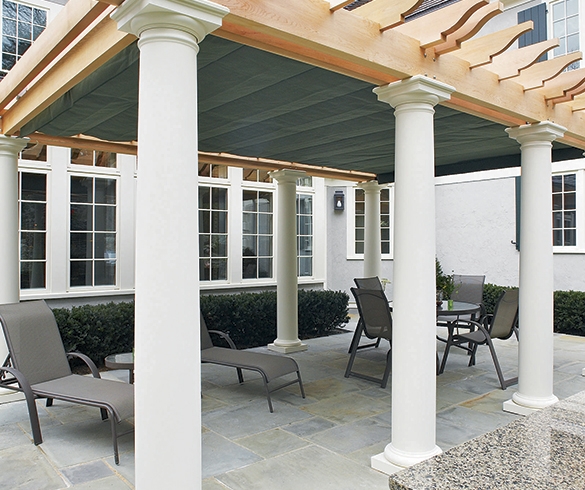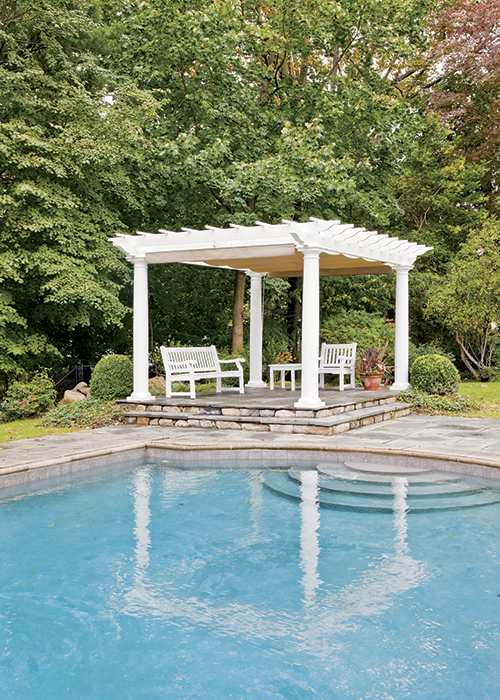
Outdoor Rooms from Top to Bottom
Outdoor rooms continue to be rated as essential by homeowners, given they are extensions of interiors and add real estate value. Yet, designing outdoor living areas comes with its share of challenges. Understanding the basics from the ground up simplifies the process.
The patio is more than a hard surface. It can serve as the outdoor room\’s focal point around which other materials and features are styled. The textures and shapes of stone flooring can lend a dimensional feel, while a deck\’s color allows it to contrast or blend with the environment.
When planning the floor, spacing is the most important component. Determining upfront if a dining area or outdoor kitchen is desired, and how many people the space will accommodate are key considerations. The patio should be planned to house these installations.
Patios, along with outdoor structures, provide exterior spaces with foundational dimensions and protected placements for furniture and accessories. \”Foundations delineate the room and establish the space that belongs to the room, and that which does not,\” says Sarah Kinbar, editor of Garden Design magazine, a leading outdoor design publication. \”Edges and boundaries created by foundations are the outdoor\’s answer to walls.\”
Outdoor product manufacturers offer exterior structures, furnishings, fabrics and designs to provide permanent enhancements that increase property values. Through a recent partnership, the outdoor room innovators at Walpole Woodworkers and ShadeFX Canopies unveiled versatility and quality as top priorities for outdoor spaces. As a result, the two companies launched a line of shade pergolas that combine cellular vinyl pergolas with retractable and integrated canopy systems.

\”As a design element, shade pergolas moderate the transition from indoors to outdoors,\” explains Steve Ostrowski, president of ShadeFX Canopies. \”The structure defines the space and provides a sense of privacy that makes dining tables and cushioned furniture feel more appropriate in outdoor areas.\”
Shade pergolas offer homeowners the ability to create sanctuaries that are covered from rain, protected from sun, impervious against wind, and immune from the stresses of daily life. Since the canopies are retractable, homeowners can switch from sun to shade at their leisure. The cellular vinyl pergolas are a low- to no-maintenance realistic wood alternative and last more than 25 years. The durable canopies offer 10 to 15 years of use.
\”With their height, depth, and width, using shade pergolas adds dimension and substance to outdoor rooms,\” says Lou Maglio, president of Walpole Woodworkers. \”Outdoor structures such as these can reflect and enhance the integrity of a home\’s architectural style.\”
When adding an outdoor structure, a homeowner should first decide where in the landscape to place it, keeping in mind views from interior windows, sunlight, and proximity to the home. \”Typical retractable awnings extend less than 16 feet, and a shade pergola can be used to cover a large area up to 600 square-feet,\” says Ostrowski. \”A design decision is whether it should be affixed to or separate from the house.\”
The remaining outdoor living area should be designed like any interior, implementing function and cohesive style. Outdoor fabrics and accessories should reveal personality while adopting juxtaposed colors, textures and lines that translate easily, as if the interior naturally extends outdoors.
According to Kinbar, outdoor rooms have always existed; they are becoming more defined as new products arrive on the market that make these spaces as livable as indoor rooms. To learn more, visit www.shadepergolas.com and www.gardendesign.com.
Source:
Walpole Woodworkers
ShadeFX Canopies





























